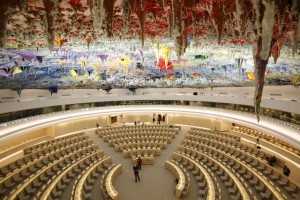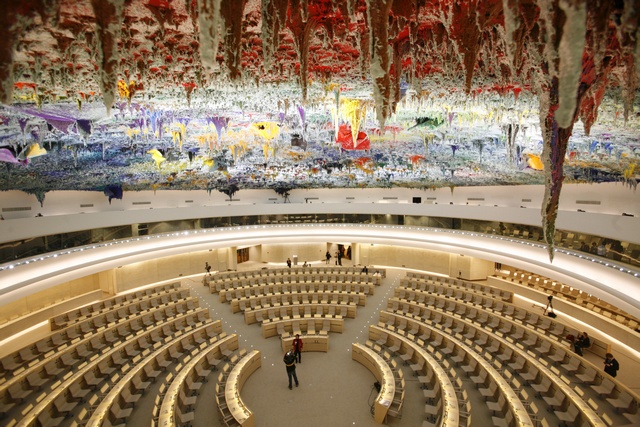
© 2008 Reuters
Today, Monday, June 15, 2015, the UN Human Rights Council inaugurates its 29th session in Geneva, scheduled to end on July 3.
In this session, the HRC will focus on the human rights situation in Syria and occupied Palestinian territory (OPT).
The HRC will review the findings of the report of the UN committee of inquiry on Israel’s most recent military attack on Gaza, which was postponed from the 28th session in March, as well as hear an update from the Independent International Commission of Inquiry on the situation in Syria. Kuwait Universal Periodic Review (UPR) outcome report will also be adopted in this session.
Several UN Rapporteurs will present reports on rights issues and recent developments, among them the Special Rapporteur on the Promotion and Protection of Human Rights and Fundamental Freedoms while Countering Terrorism, the Special Rapporteur on Violence Against Women, the Special Rapporteur on the Right of Freedom of Opinion and Expression, the Special Rapporteur on Freedom of Association and Peaceful Assembly, and the Special Rapporteur on the Independence of Judges and Lawyers.
The HRC will also discuss a joint report by several UN Rapporteurs on Special Procedures. The report examines complaints received about human rights violations in various states from December 2014 to February 2015, communication sent to these states, and the official responses from them.
The joint report includes complaints and official correspondence on violations in Tunisia, the United Arab Emirates, Qatar, Egypt, Saudi Arabia, Oman, and Bahrain, most of them related to cases of arbitrary detention, torture, and violations of the right to freedom of opinion and expression, freedom of association and peaceful assembly, human rights defenders, extrajudicial killing, and the lack of due process in trials.
As non-government organizations play an important role in highlighting human rights conditions in various countries and confronting governments for their violations of these rights, the HRC provides a space to present their views through its system of written or oral interventions. Enjoying consultative status with the United Nations, CIHRS presents its interventions and reports in this framework.
This morning in his report to the Council, the UN High Commissioner for Human Rights stated: “Egypt’s rich culture is threatened when civil society and human rights defenders are under attack.”
The inauguration of the HRC session comes at a time in which Egyptian rights organizations are under unprecedented attack, with the judiciary and the media being used as tools in the quest to eliminate the human rights movement in Egypt. As part of this assault, CIHRS was recently referred to investigation for its rights activities.
In this session, CIHRS submitted a written intervention, prepared jointly with several Palestinian organizations and NGOs working on the rights of Palestinians[1], on the protection of Palestinian human rights, offering its recommendations on ensuring accountability and an end to impunity, especially in light of the report to be presented by the independent commission of inquiry on the 2014 Gaza conflict.
CIHRS is also scheduled to present several oral interventions to the Council addressing the status of freedom of association in Egypt and the role that non-governmental organizations play in countering extremism and violence. In addition, CIHRS will also address the human rights situation in other Arab countries which have experienced an unprecedented escalation of violence and widespread impunity such as Syria and the OPT.
In cooperation with several international and regional organizations, CIHRS is organizing three panel discussions on the sidelines of the session dealing with the human rights situation in Syria and Palestine. The first side event, to be held on June 23, is organized by CIHRS in cooperation with a number of international and Syrian organizations. It will address the increasing human rights violations in Syria, ways to counter them and avoid impunity in light of the international failure to find effective means for accountability.
CIHRS is dedicating the other two side events to examining human rights violations against Palestinians in conjunction with several Palestinian rights groups. Both side events will provide analysis on the report presented by the UN Inquiry mission on the recent Gaza conflict, while one event will present a legal analysis with a focus on the necessity for international accountability mechanisms to be enacted. The second event will provide information on the human devastation caused by military attacks on Gaza with a panel presenting information from the ground on attacks on medical infrastructure, civilians, and children.
The HRC is the official UN body for human rights issues. It holds three regular sessions every year to examine human rights issues in countries around the world. The council has 47 member states, elected to the HRC from different regions and serving defined terms. The HRC began operating in 2006, inaugurating its first session on June 19, 2006.
Immediate action needed to guarantee accountability
[1] The organizations: Al Mezan Center for Human Rights, Al Haq, BADIL resource center for Palestinian residency and refugee rights, Medical Aid for Palestinians, and the Civic Coalition for Palestinian Rights in Jerusalem.
Share this Post

